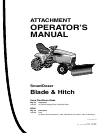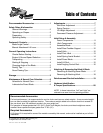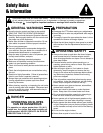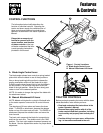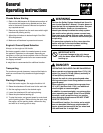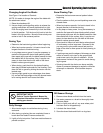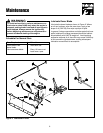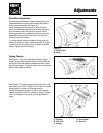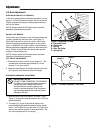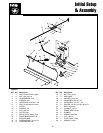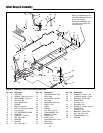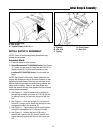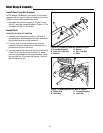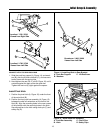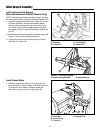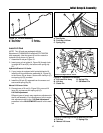
4
Checks Before Starting
1. Refer to the Maintenance & Adjustments sections of
this manual and perform any needed service. Also,
refer to the tractor Operator’s Manual and perform
any required service.
2. Remove any objects from the work area which might
interfere with plowing activity.
3. Adjust the skid shoes to desired height. See Skid
Shoe Adjustment.
4. Make sure all hardware is present and secure.
Engine & Ground Speed Selection
Always run the engine at full throttle.
Set tractor speed to obtain the needed power to move
the material. Operate at a safe speed, depending on
conditions, so that you have complete control of the trac-
tor. Rear wheel weights and chains are recommended
for slippery surfaces.
A weight box is recommended for additional traction.
Transporting
For maximum ground clearance, transport the blade to
and from work areas fully raised and angled straight
ahead.
Starting & Stopping
1. Start the tractor engine. Set engine throttle to full.
2. Raise the attachment lift and travel to the work site.
3. Set the angling control to the desired angle.
4. Lower the attachment lift and begin plowing.
5. Raise the plow before backing up.
6. To stop the tractor, set ground speed to neutral and
set the parking brake. Before leaving the seat, stop
the engine, set the parking brake, remove the key,
and wait for all moving parts to stop.
General
Operating Instructions
WARNING
Perform the Safety System Interlock test found in
your tractor Operator’s Manual. If tractor does not
pass the test, do not operate the tractor. See your
authorized dealer. Under no circumstances
should you attempt to defeat the safety system.
Use caution when plowing a snow covered area.
Snow can cover objects such as curbs, drop-offs,
and other obstacles. Be familiar with the area you
are plowing.
To prevent an explosion or fire, never store the
tractor with fuel in the tank inside a building
where an ignition source is present.
DANGER
OPERATING ON SLOPES CAN BE DANGEROUS
Never operate on slopes greater than 17.6% (10°)
which is a rise of 3-1/2 feet (106cm) vertically in
10 feet (607cm) horizontally.
Operate the unit at a slow ground speed when
driving onto slope. Avoid using brakes to control
ground speed.
When operating on slopes that are greater than
15 % (8.5°) but less than 17.6%, use additional
wheel weights or counterweights.
In addition to counterweights, use extra caution
when operating on slopes. Drive UP and DOWN
the slope, never across the face, use caution
when changing directions and DO NOT START
OR STOP ON SLOPE.
For additional traction, tire chains and a weight
box can be added. Maximum weight added to
tractor should not exceed 35 lbs. per wheel and
100 additional lbs. in weight box.
IMPORTANT NOTE
To prevent damage to the unit, always
raise the dozer blade BEFORE turning or
backing up.



